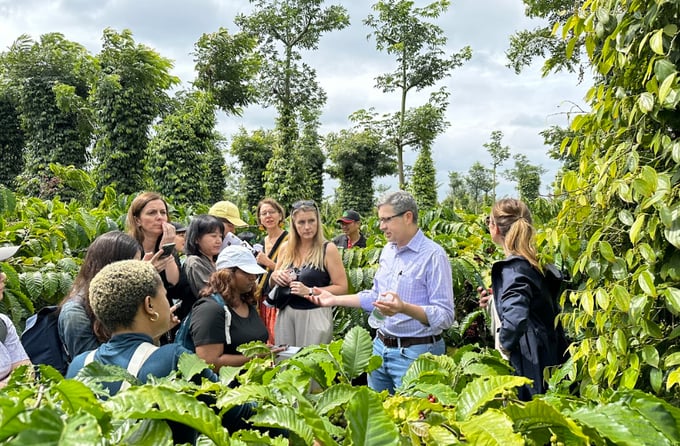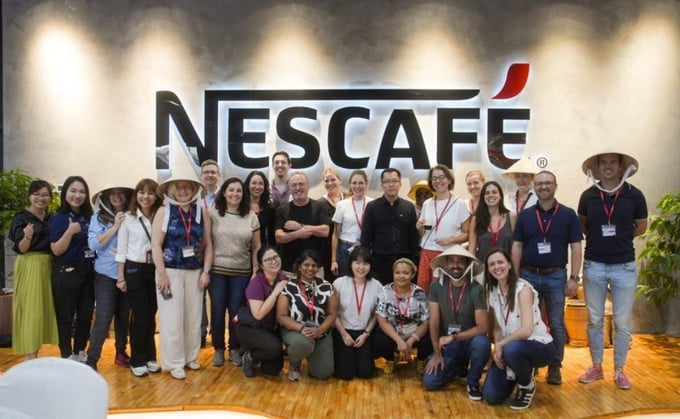November 27, 2025 | 16:09 GMT +7
November 27, 2025 | 16:09 GMT +7
Hotline: 0913.378.918
November 27, 2025 | 16:09 GMT +7
Hotline: 0913.378.918

The press tour for international media serves as an opportunity for Nestlé Vietnam to introduce Vietnamese coffee to global consumers. Photo: NVL.
Within a three-day journey, nearly 30 representatives from Nestlé Company across various countries, in addition to journalists and editors from international news agencies such as Bloomberg, CNBC, Business Day, SIC Television, participated in a tour to sustainable NESCAFÉ Plan models, coffee processing plants, and explored coffee culture in Dak Lak province, Dong Nai province, and Ho Chi Minh city.
This opportunity allowed Nestlé Vietnam to showcase its initiatives in regenerative agriculture, engagement with coffee farmers, sustainable coffee production practices, and deep processing activities to enhance the value of coffee beans.
The program also aims to meaningfully promote the image of the Vietnamese coffee industry both domestically and internationally.
International journalists had the opportunity to expereince the journey of high-quality Vietnamese coffee beans from the nurseries to the hands of farmers through programs supporting replanting and sustainable coffee production.
Additionally, the journalists visited Nestlé's modern coffee processing plant, where products from high-quality Vietnamese coffee beans are created for both domestic consumers and export to international markets.
With the aim of meeting the demand for high-quality coffee domestically and internationally, Nestlé Vietnam has been actively supporting farmers nationwide in replanting aging coffee trees, transitioning to regenerative agriculture, increasing income, and integrating production, processing, and export activities to create added value for Vietnamese coffee beans since 2011.
After twelve years, with the implementation of the NESCAFÉ Plan in the Central Highlands provinces, Nestlé Vietnam has distributed over 74.3 million disease-resistant and high-yield coffee seedlings for replanting purposes.
In addition to this project, farmers have reduced irrigation water usage by 40 to 60%. Additionally, local coffee production saw a 20% reduction in the use of pesticide and chemical fertilizers. On the other hand, farmers have utilized intercropping techniques for coffee and pepper, improved land use efficiency, enhanced ecological diversity, and reduced environmental emissions.
As of 2023, 90% of farmers within the surveyed coffee farms have adopted the naturally grown shade method, and 86% of farms have diversified crops with an average of three different species.

The international media delegation visiting the NESCAFÉ Information Center at Tri An Factory, Dong Nai province. Photo: NVL.
By implementing sustainable farming methods, local farmers' income level has improved by 30 to 100% compared to before the project was implemented.
Furthermore, all coffee products supplied from Vietnam meets the 4C standards as imposed the Common Code for the Coffee Community, thereby ensuring processing for both domestic consumption and export to 29 markets worldwide.
As part of the program, the international media delegation also visited the Nestlé Tri An Factory, which is one of the largest coffee factories in Vietnam, as well as Nestlé's most modern coffee processing facilities in the region.
At the factory, the delegation was introduced to the modern production line following a circular process, ensuring quality throughout the sustainable coffee value chain which includes the stages of cultivation, procurement, production, processing, export, and consumption.
In addition to acquiring information on sustainable farming efforts in coffee farms, the delegation was briefed on Nestlé's practical sustainable initiatives in production, such as the circular economy models, and the procedures for processing, recycling, and reusing waste from production. Notably, an average of 60 to 65% of the total wastewater from coffee processing facilities are treated for reuse per year.
Furthermore, all of the produced coffee pulp is used as biomass energy. Subsequently, boiler ash is provided to partners as raw materials for the production of unfired bricks.
All of Nestlé Vietnam's factories have achieved the goal of zero landfill waste since 2015.
Nestlé not only produces delectable coffee cups from responsibly cultivated coffee beans but also contributes to a sustainable future.
Within the last few years, the Vietnamese coffee industry has consistently received recognition and praise from numerous reputable international media outlets.
Nestlé Vietnam aims to continue popularize the image of Vietnamese coffee culture and contribute to promoting the country's coffee beans and the coffee industry on the international media stage.
Within the framework of the Partnership for Sustainable Agriculture in Vietnam (PSAV), Nestlé Vietnam Company Limited, representing the global Nestlé Group, and the Ministry of Agriculture and Rural Development signed a Memorandum of Understanding to enhance public-private cooperation, thereby committing to the development of sustainable agriculture, regenerative agriculture, and low emissions. Subsequently, the leadership of the Ministry of Agriculture and Rural Development has arranged a meeting with Mr. Mark Schneider, the Global Chief Executive Officer of Nestlé.
Translated by Nguyen Hai Long
/2025/11/26/4909-2-154329_878.jpg)
(VAN) Pearl grouper farming in HDPE cages not only delivers economic efficiency but also contributes to protecting the environment, creating jobs, and promoting marine-based experiential tourism.

(VAN) The model of making a living under the forest canopy through the agroforestry system in Van Son commune, Bac Ninh province, is expected to generate an annual income of approximately VND 30 million/ha.

(VAN) Many enterprises in Can Tho are harnessing natural energy and reducing greenhouse gas emissions in their production processes, thereby contributing to the promotion of a sustainable green transition.
/2025/11/24/3536-2-112800_176.jpg)
(VAN) Dong Nai now has tens of thousands of hectares of forests certified for sustainable management, and this area will continue to be expanded in the coming period.

(VAN) Vinh Ha hamlet (Dai Xuyen commune, Hanoi) is shifting away from small-scale farming as households adopt bioscurity into their breeder chicken models.

(VAN) Heavy rains make aquatic species more vulnerable to disease. Proactive water management and high-tech systems help farmers prevent outbreaks and protect yields.

(VAN) Greenhouses are shifting production mindsets in Binh Lu commune, enabling farmers to ‘weather the sun and rain’ and secure stable vegetable harvests throughout the year.